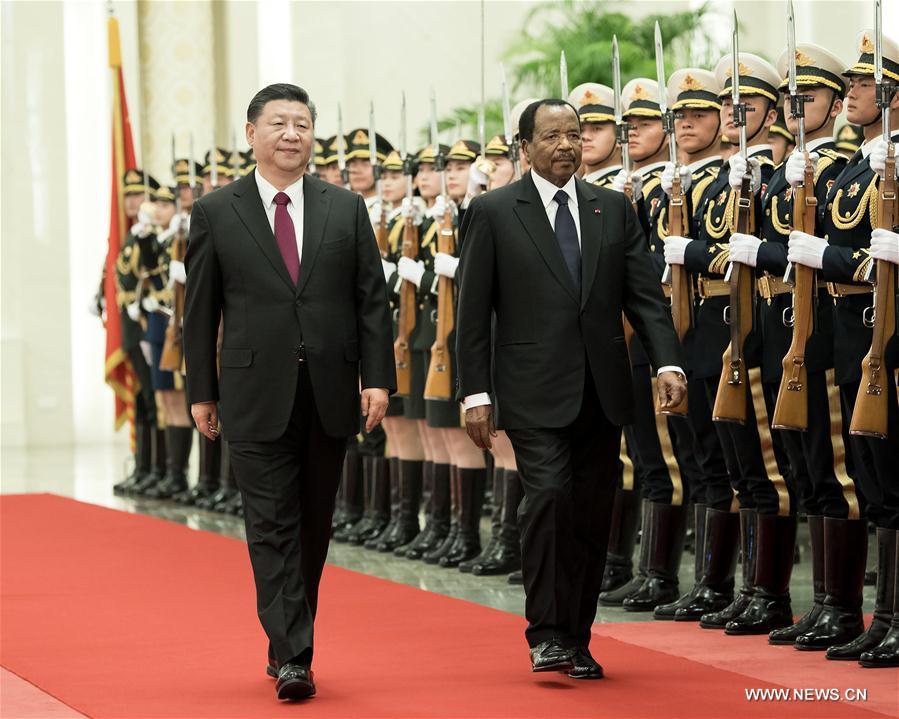There have been reports, since the end of 2021, that China intends to establish a military base in Equatorial Guinea, a small state on the west coast of Africa which includes a number of islands within its borders. Although American estimates consider the establishment of this base unlikely at present, various developments have led to speculation on whether China will seek to replicate its successful establishment of a base in Djibouti in another African country. China has lately made efforts to redistribute its economic and military presence in Africa in a more balanced manner and is keen to use its influence in Africa to buttress its international position, vis-à-vis growing pressures from the US, that have been intensifies in response to Russia’s war in Ukraine. In this context, it becomes important to monitor China’s growing presence in west Africa, the motives behind this interest, and how it could impact African states.
Manifestations of Chinese presence
The last few years have witnessed significant growth in the manifestations of Chinese presence on Africa’s Atlantic coast, although China has had some form of presence in that region for decades. These new manifestations include:
Increased military and security cooperation: The operational plan approved by the African Chinese Forum for Cooperation (FOCAC) in 2018 included a special section devoted to military assistance from China, including security cooperation for the combatting of terrorism. This represented a radical change in China’s approach to the continent, as it is now prioritizing security and military assistance. In west Africa, China is building a cooperative relationship with several key states on security. It appointed its first security attaché in its embassy in Yaoundé in 2013 and has delivered 10 shipments of military equipment to Cameroon between the years 2012 and 2014. The shipments included Surface to Air Missiles, armored vehicles, radars, and detection equipment. These shipments helped to prepare the Cameroonian Armed Forces to repel the expansions of terrorist groups in the north of the country and contain the secessionist movements in the southwest. Chinese experts have also been on hand in helping to develop a naval base in Douala as part of a defense agreement signed between China and Cameroon in 2018, which included Chinese military equipment worth 8 million dollars. In 2019 China signed an MOU with Nigeria that allowed for an initial shipment of military aid of up to 50 million yuan to support Nigeria’s efforts in combatting terrorism. In 2018 the President of Gabon Bongo Ondimba welcomed the Chinese defense minister to talks in which they agreed on enhancing bilateral defense cooperation.
China’s growing role in port development: China has become the most prominent player in developing naval ports in Africa, especially on the west coast of Africa. China enjoys a large influence in ports extending from Mauritania to the north, including Guinea, Sierra Leon, the Ivory Coast, Ghana, Togo, Nigeria, Cameroon, and Angola. China’s roles range from financing, operating or building the ports, in some instances combining all three, in order to reduce the potential for any competition. China’s presence in these ports have implications for buttressing its economic standing globally, far beyond Africa.
Increasing volume of trade: As reflected in the data for the year 2019, pre-dating the effects of the COVID-19 pandemic, west African states topped the list in terms of Africa’s trade with China. In terms of Chinese imports from Africa, Angola accounted for 25% of all of Africa’s trade with China, Congo came next with 7%, Ghana and Nigeria were next with 3.5% each, then finally Guinea 2.7%. Outside of west Africa, only South Africa accounted for a sizeable portion of Chinese imports, amounting to 21% . As for Chinese exports to Africa, Nigeria and South Africa tied for first place, accounting for 14% each, out of a total of 15 billion dollars’ worth of exports.
Growing Chinese imports of oil from west Africa: China is dependent on oil imports from abroad to develop its economy, and for strategic reasons, it has always avoided depending on one source only. Of the top 15 countries that export oil to China, three are in West Africa. Angola provides more than 14 billion dollars’ worth of oil, which constitute 8% of total Chinese oil imports, the DRC provides over 3 billion dollars’ worth of oil, or 1.7% of total Chinese imports, followed by Gabon, which provides 2 billion dollars’ worth of oil, or 1.2% of all Chinese oil imports.
Motivations
China’s motivations in increasing its presence in West Africa are related to several factors, including the strategic importance of the region, and the ongoing competition between China and several global actors, these factors include:
Evading competitors in east Africa: East Africa has traditionally been the hub of Chinese presence, heavily concentrated in the developments of ports, infrastructure and transportation. China has also been involved in projects to further regional integration, especially those involving the region’s two largest economies: Kenya and Ethiopia. China’s presence received added significance with the establishment of its first military base outside its borders in Djibouti, which became operational in 2017. The relative closeness of East Africa to China played a role as it gave China an added edge in terms of logistics and trade. However, this geographic location also attracted Asian competitors, such as Japan and India, who have been intensifying their activities in the region as well. China has therefore moved westwards in order to maintain the benefits it has been getting from its presence in Africa, without bearing the costs of growing competition.
Going on the Offensive: China is aware that the increased pressures from Asian competitors, especially India and Japan, is related to mounting US efforts to contain its rise. This has been illustrated by the launch of the Quadrilateral Security Dialogue, or “QUAD”, which includes the US, India, Japan, and Australia. To counter this mounting pressure in the Indo-Pacific region, China is seeking to increase its competitive edge and bargaining cards by establishing presence on the coast of the Atlantic, bolstered by its strong presence in Africa as a whole.
Conducive political and security conditions in West Africa: Conditions in the region make Chinese support attractive to the ruling regimes, as it does not come with conditions. This is particularly important to countries such as Equatorial Guinea and Cameroon, as they have been under one-man rule for the past 40 years. On the security level, regional states were not prepared to deal with the rise of terrorist activities, and their cooperation with other international partners in this respect has not been successful. These countries were therefore in search of a new partner to provide support, not only on the security level, but also to counter the political and economic impact of terrorism. China found this an appropriate opening to establish its presence in West Africa.
Building a Trans- Atlantic network: Although Latin America is not part of the Belt and Road initiative, President Xi Jinping, during his visit to Argentina in 2018, considered it a natural extension of this initiative, to be integrated in the 21st century. During the same year, China established a new forum for cooperation with Latin America and the Caribbean nations, the CELAC Forum, in the Chilean capital of Santiago. The Chinese Foreign Minister invited Latin American states to support the projects of the Belt and Road Initiative, an endeavor formalized in an official declaration. China wishes to complement its growing presence on the Atlantic east coast of the South American continent, with a presence on the Atlantic west coast of Africa. This would allow it to construct a logistical network spanning the Atlantic Ocean, thereby enhancing its presence in what is considered a US backyard. A strong presence in the Western Hemisphere would therefore provide China with additional leverage to counter US pressures.
In conclusion, it can be argued that China’s increased interest in West Africa , particularly the coastal regions, comes in the context of improving its competitive edge against its global adversaries. This growing international competition over influence and economic interests in Africa is likely to have a destabilizing effect on the continent. This has been illustrated by developments in the East Africa region, where regional frameworks have proven ineffective in establishing stability due to external interventions and influence. The countries of West Africa should therefore approach Chinese interests in the region carefully and consider their own interest when entering new agreements with any international actors.

